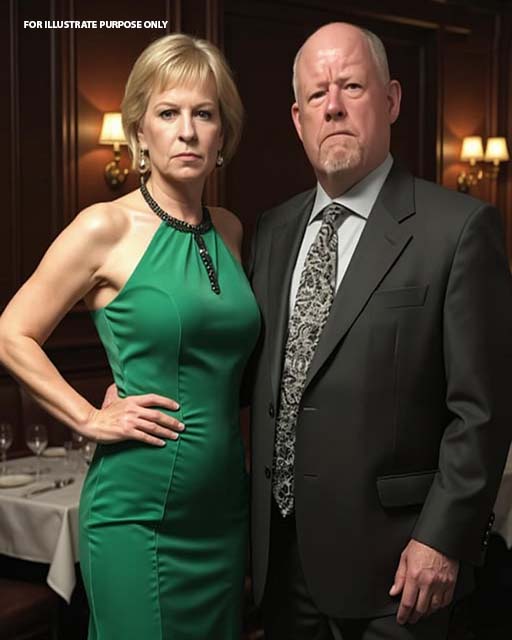I used to think marriage was a math problem: you add what you can, subtract what you must, and it balances out. That belief carried me through our vows and through the years that followed—years that carved me down to the bone. Somewhere along the way, Jason forgot the math. Or maybe he never learned it.
Six years in, we had three kids—elementary, kindergarten, and a baby who still woke me three times a night. I worked twelve-hour hospital shifts, came home smelling like antiseptic and burnt coffee, and clocked into a second job: dinner, dishes, homework, baths, laundry, bedtime. My body hummed with exhaustion most hours of the day.
Jason had been laid off earlier that year. “Temporary,” he told everyone, like the word would float him across the months. He called job hunting a full-time gig. I called it scrolling: couches and timelines and the quiet rustle of his ego as I handed him plates.
Ruth’s birthday dinner was the kind of noisy, buttery family chaos she lived for—turkey and cinnamon and a table stretched to its limits with mismatched chairs and elbows. I had barely sat down when Jason nudged me for the salt. I passed it without a word, reminding myself not to count every small thing I did that he didn’t.
Halfway through the meal, his brother Leo puffed himself up like a rooster and announced, to applause, that his wife, Chrissy, had started Zumba. “And she dances for me every night,” he added, waggling his eyebrows.
The men hooted. Chrissy giggled behind her napkin. I smiled politely and felt something inside me tighten. My feet still ached in their compression socks. The idea of coming home to dance for my husband felt like a cruel joke told too loud.
Jason didn’t laugh. He leaned forward, eyes bright like a kid at a candy counter. He drained his beer, set his fork down with a clatter that cut the room in half, and said, “Hey, Jess! Why can’t you dance for me every night like Chrissy does for Leo? You’ve forgotten what it means to be a woman. All you do is nag about work and the kids. If I wanted a roommate, I’d get one. If you don’t start giving me what I need, maybe I’ll find it somewhere else.”
Silence. Forks frozen midair. A cousin stopped halfway down the hall. Heat crawled up my neck. Leo started humming “Dance Monkey,” smirking like he’d discovered a new form of oxygen.
“Jason,” Ruth said softly. “That isn’t fair.”
I set my fork down, felt the edge of myself, and chose it. “Why? Maybe because after twelve hours on my feet, I cook, feed three kids, scrub bathrooms, fold laundry, rock the baby, clean the kitchen, and collapse at midnight—while my husband keeps the couch from floating away. Forgive me if I don’t have the energy to shake it for you after running myself into the ground.”
Mark, the loudest brother, broke the silence with a donkey laugh. Jason went white, scraped back his chair, and stormed out. I followed him into the cold porch air, my pulse loud in my ears.
“What was that?” I asked.
“You embarrassed me,” he snapped. “You could’ve laughed it off. Said yes. Instead you made it awkward.”
“You threatened to ‘find it somewhere else,’” I said. “Do you hear yourself?”
He turned toward the car. “Get the kids. We’re leaving.”
The drive home was a seesaw of sharp words and stone silence. By the time we pulled into the driveway, we were both emptied out and no closer to understanding. He rolled to his side in bed without a word. I stared at the ceiling, guilt and anger twisting together until they were indistinguishable.
Near midnight my phone buzzed. It was Ruth.
Good on you for calling him out. He stepped way out of line. I’m embarrassed to have raised him.
I blinked at the screen. We weren’t especially close; she loved her sons fiercely, sometimes blindly. Before I could reply, another message:
Men like Jason don’t learn unless you give them a real lesson. Want my help?
What kind of lesson? I typed back.
Play along, she wrote. Tell him you’ve thought about it. You’ll give him what he wants. Then let me deliver the surprise.
Two nights later, while the kids slept, I dimmed the living room lights and queued a soft playlist. Jason wandered in, smirk already in place.
“What’s this?” he asked, though his grin said he knew.
“A surprise,” I said, steady as I could manage.
“Finally,” he said, dropping onto the couch like a king. “About time you acted like a wife again. Wait till I tell Leo.”
My stomach turned. I swayed just enough to keep the scene intact.
The front door opened.
Ruth stepped inside in her buttoned coat, eyes like cut glass. Jason jumped to his feet.
“Mom? What are you—”
“Don’t stop,” she said, lowering herself into the recliner. “You wanted your wife to dance every night? Let’s see it. Show me what kind of man I raised.”
He floundered. “This isn’t—”
“It is exactly this,” Ruth said, voice even and unforgiving. “You have a wife who works herself raw caring for the sick, raises three children, keeps this house from falling apart while you sulk—and you demand a show? You threaten to go elsewhere? A real man doesn’t humiliate his wife at a dinner table. A real man doesn’t reduce his partner to entertainment.”
The house hummed: refrigerator, clock, breath. Jason’s hands twitched at his sides. He opened his mouth, then closed it.
“You wanted a lesson,” Ruth said. “There it is. Respect is worth more than bragging rights. Your wife deserves better than your ego.”
She stood, gave me the smallest nod, and left him standing in the dim room, his face drained of color. He went to bed without speaking. For once, the shame wasn’t mine to carry.
In the morning, I found him pouring cereal for the kids. He kept his eyes on the bowl.
“You’re right,” he said. “Mom too. I’ve been acting like a fool.”
I nearly dropped the baby’s bottle. “Did you just admit I was right?”
“Don’t push it,” he muttered, but the edge was gone.
Shifts came slowly. He started packing lunches. Folding towels. Emptying the dishwasher without being asked. He made dinner once—sticky pasta, watery sauce—and Ava, our kindergartener, asked, “Daddy, are you helping Mommy now?”
“It’s about time,” he said.
He didn’t bring up the word “dance” again. If anything, it seemed to make him flinch. The apology wasn’t grand; it was repetitive—small acts, repeated until they meant something. He was still Jason: stubborn, proud, sometimes thoughtless. But he’d seen himself through his mother’s eyes, and the reflection rattled the scaffolding he’d built around his pride.
I stopped feeling like a ghost in my own life. I stopped measuring love in ounces of energy I didn’t have. We were never going to be a stage show. We were a household with sticky floors and soft-cheeked kids and a partnership that needed rebuilding from the ground up. He finally understood that I wasn’t his entertainment. I was his wife.
On the nights when the baby slept and the house exhaled, music sometimes drifted from the speaker anyway. We didn’t perform. We swayed in the kitchen, socks sliding on tile, plates drying in the rack. He’d tuck his chin on top of my head and whisper, “Thank you.” I’d answer, “For what?” and he’d say, “For staying.”
It’s not the dance he wanted. It’s better. It’s the one where both of us show up, hands full, hearts open, and nobody gets asked to earn their place at the table by putting on a show.




